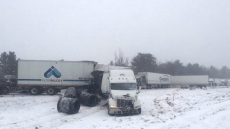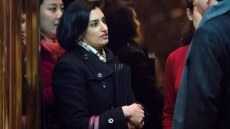VANCOUVER — No matter where she went, Nikki Peterson says strange and unexplained phenomena seemed to follow her while she was growing up.
There was the brand new apartment where the cupboards opened and closed, or the home where the front door unlocked multiple times throughout the night. But as a petrified teenager searching for answers, she had nowhere to turn except the library.
"When I had all this stuff happening to me, there was no one really to go to," she said. "I wanted to be able to be there for those that need the help."
Peterson co-founded Northern Paranormal Investigations, which responds to reports of mysterious activity in B.C.'s Lower Mainland. The group is one of several being studied by Prof. Paul Kingsbury of Simon Fraser University.
Kingsbury and his graduate students are in the second year of a four-year research project on ghost hunters, UFO enthusiasts and Sasquatch searchers. He is set to release their preliminary findings at a lecture in Surrey on Wednesday and has found the groups can offer people closure and peace of mind.
As a cultural geographer, Kingsbury said he was interested in examining why people were drawn to these three spooky subcultures. He's conducted focus group interviews with ghost hunters, attended two UFO conferences and one Sasquatch summit and observed nine ghost investigations in B.C.
While he has never personally had a brush with the paranormal, Kingsbury said he believes the investigators when they speak about the importance of their experiences.
"I guess I'm more interested in the role of wanting to believe, if you recall Agent Mulder's poster in 'The X-Files,' " he said, referring to an iconic poster in the office of the alien-chasing TV character.
"I think the paranormal entity, be that a spaceship or a Sasquatch or ghost, is a perfect object of desire because it's always out of reach. It can never be caught up with or placed into a box or a test tube."
Kingsbury said stereotypes about scam artists or paranoid conspiracy theorists don't hold up.
Ghost hunters can offer relief to clients and typically don't charge for their services, he said, while those claiming they have been abducted by aliens often recognize how laughable their stories sound, but they just want to tell them and feel accepted.
"Many of them feel that they cannot 'come out,' to use that metaphor, as abductees," he said. "They feel they cannot be open or truthful about something that has marked their lives profoundly."
There are skeptics within these groups, he added, particularly in the UFO community, where some people are not convinced by the stories of abductions and would prefer a more objective analysis of flying-object phenomena.
At Northern Paranormal Investigations, the team responds to calls by researching the history of the location before conducting an on-site investigation that aims to debunk the haunted-house claim, said Peterson.
In the majority of cases, there is a mundane explanation, such as mould under the floorboards that looks like blood seeping through, she said.
But there are cases that can't be rationally explained. Once, she said, a white form appeared in front of her and punched her in the face, while on other occasions investigators have heard deafening unexplained noises or she's felt hands touching her.
At the end of an investigation, the group holds a session sometimes called a "reveal," in which they provide their findings. Sometimes, they show video recordings or audio recordings of what they saw or heard, said co-founder Darryl Pearson.
Pearson said the team shares the evidence and offers theories but does not provide a concrete explanation. He has recorded unexplained voices or sounds, but he said he does not believe he has found definitive proof that ghosts exist.
"If some team got proof and said, 'We're 100 per cent sure this is a ghost or a spirit,' and people could look at it and say, 'You know what, there's no way we can deny this,' then I probably wouldn't be doing what I'm doing. Because we'd then know."





